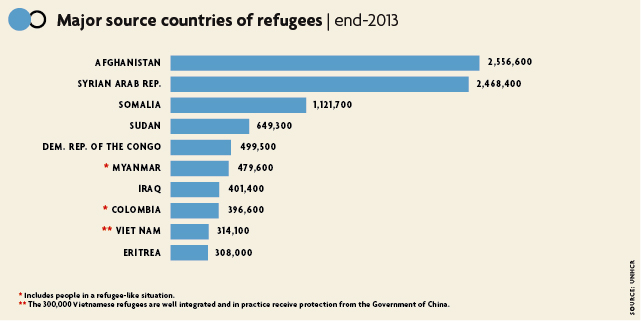Coping with ever more refugees
The number of people living as refugees from war or persecution has exceeded 50 million for the first time since WWII, according to the United Nations.
The overall figure of 51.2 million for 2013 is six million higher than the previous year, a new report by the UNHCR (United Nations High Commission for Refugees) says.
UNHCR High Commissioner Antonio Guterres told media this week the rise presented a “dramatic challenge” for aid organisations.
Conflicts in Syria, central Africa and South Sudan have fuelled the sharp increase, Mr Guterres said. “Conflicts are multiplying, more and more. And at the same time old conflicts seem never to die,” he said
Of particular concern are the estimated 6.3 million people who have been refugees for years or even longer; sometimes even decades.

Major source of refugees, end 2013 (UNHCR)
People living in what the UN terms “protracted” refugee situations include more than 2.5 million Afghans. Afghanistan still accounts for the world’s largest number of refugees, and neighbouring Pakistan is host to more refugees than any other country, with an estimated 1.6 million.
Around the world, thousands of refugees from almost forgotten crises have spent the best part of their lives in camps. Along Thailand’s border with Burma, 120,000 people from Burma’s Karen minority have lived in refugee camps for more than 20 years.
Refugees should not be forcibly returned and should not go back unless it is safe to do so, and they have homes to return to, the UN says. For many – among them the more than 300,000 mainly Somali refugees in Kenya’s Dadaab camp – that is a very distant prospect.
Some camps have become virtually permanent, with their own schools, hospitals, and businesses. But they are not, and can never be, home, the UN report says.
But the world’s refugees are far outnumbered by the internally displaced (IDPs) – people who have been forced to flee their homes, but remain inside their own countries.
In Syria alone there are thought to be up to 7 million displaced people and more emerging in neighbouring in Iraq.
The conflict has uprooted many families not once but several times. Their access to food, water, shelter and medical care is often extremely limited, and because they remain inside a conflict zone, it is hard for aid agencies to reach them, the report says.
Worldwide, the UN estimates there are now 33.3 million internally displaced people.
Large numbers of refugees and IDPs fleeing to new areas inevitably put a strain on resources, and can even destabilise a host country.
Throughout the Syrian crisis, Lebanon, Jordan and Turkey have kept their borders open. Lebanon now hosts more than a million Syrian refugees, meaning a quarter of its total population is Syrian.
The pressure on housing, education and health is causing tensions in a country which itself has a recent history of conflict.
The UN is concerned that the burden of caring for refugees is increasingly falling on the countries with the least resources. Developing countries are host to 86 per cent of the world’s refugees, with wealthy countries caring for just 14 per cent.
And despite the fears in Europe about growing numbers of asylum seekers and immigrants, that gap is growing. Ten years ago wealthy countries hosted 30 per cent of refugees, and developing countries 70 per cent.
Mr Guterres says the developed world should do more. “I think it’s very important that developed countries fully assume their responsibilities,” he said.
But UN aid agencies are becoming increasingly frustrated by being asked to cope with ever more refugees, while the UN’s political arm, the Security Council, seems unable either to resolve conflicts, or to prevent them starting.
“The world is becoming more violent, and more people are being forced to flee,” Mr Guterres said.
“There is no humanitarian solution to these problems… to see the Security Council paralysed, when all these crises are evolving, is something that doesn’t make sense.”
“What frustrates me is the suffering of people, to see so many innocent people dying, so many innocent people fleeing, so many innocent people seeing their lives completely broken, and the world being unable to put an end to this nonsense.”













